*
| |
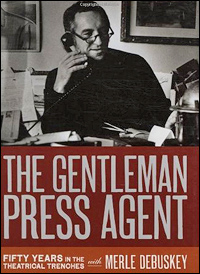 |
|
By Robert Simonson
Published by: Applause Theatre & Cinema Books
Publication Date: May 2010
List price: $29.99 hardcover; 292 pages, illustrated
In the Introduction to his new book about Merle Debuskey, author Simonson writes, "he had an acute case of integrity wholly at odds with his occupation." Before Debuskey branded it with his unique set of qualities, the profession of theatre publicist belonged to men (and it was almost entirely devoid of female participants) whose street-smart stock-in-trade was the backroom deal or the P.T. Barnum-like publicity scheme. Debuskey was of a different stripe. For starters, straight out of a stint in the armed forces, where he saw action in the Pacific during WWII, Debuskey went to graduate school on the GI Bill, earning a master's degree in public relations from the New School. He was different in manner, too. Tall, handsome and athletic (he was an All-American lacrosse player in his high school days), the Jewish, Baltimore-bred Debuskey avoided the normal flack vices of drink and gambling and the standard operating procedure of drumming up publicity for their clients by feeding half-truths (read: gossip) to newspaper columnists. Instead he spent his free time playing tennis and building a reputation as a man of candor, puffing on his trademark pipe and knocking out press releases on his manual typewriter that were legendary in their length, originality and use of language. In a business where being a "yes man," was the norm, Debuskey posted a sign in his office that read, "No is also an answer." Instead of creating enemies, his moral code appealed to some of the most prolific and successful producers working in the theatre during his time. From the 1940s through the mid-1990s, Debuskey handled more Broadway shows than any press agent in history, collaborating with the likes of Joseph Papp, for whom he orchestrated—behind the scenes—Papp's ultimately victorious battle against Robert Moses to keep Shakespeare in the Park free; Mike Todd, the flamboyant showman; Alexander Cohen, who, among other credits, produced the Tony Awards for 20 years; and Philip Rose, who produced Lorraine Hansberry's groundbreaking A Raisin in the Sun, the first Broadway play by an African American woman. The Debuskey story includes his strong opposition to Joseph McCarthy and his professional and personal friendships with several of the victims of the blacklist, including Jack Gilford, Zero Mostel, Sam Wanamaker and John Henry Faulk; his romance with actress Kim Stanley; and his handling of a difficult Mort Saul, who verbally abused him during rehearsals for Lorraine Hansberry's The Sign in Sidney Brustein's Window and whom Debuskey promptly lifted up by his signature sweater and dared him to keep talking; or the brilliant George C. Scott, whom Debuskey recalls dragging from the theatrical hangout Patsy's to the Billy Rose Theatre where Scott could not go on that night in The Wall due to his inebriated state. To tell this colorful tale, author Simonson not only had access to Debuskey's voluminous files of correspondences, documents, photographs and press clippings but also to the man himself, interviewing him a number of times across a period of two-and-a-half years. Among the other cast members in Debuskey's life interviewed by Simonson are theatre vets Emanuel Azenberg, Bernard Gersten, Shirley Herz, Philip Rose, Marilyn Stasio, Ruby Dee, Clive Barnes and Jeffrey Horowitz (founder and artistic director of Theatre for a New Audience and author of the book's Foreword). Though Debuskey was immersed in the theatre for most of his adult life, in his post-retirement years, when asked to comment on his proudest moment, the "gentleman press agent" speaks not of his 50 years in the theatre, but of his tour aboard a WWII Navy ship. And, curiously, the throughline to his life in the theatre is echoed in his words. "We had been part of an effort we deemed noble—strangers working together in a common cause for the common good," he tells Simonson. "I came away with the belief that with purpose, sacrifice, [and] willingness to work diligently, respecting the efforts and choices of others, almost anything was within one's grasp."
| |
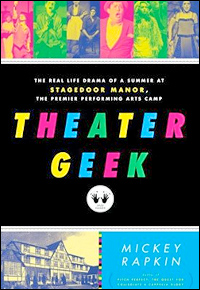 |
|
By Mickey Rapkin
Published by: Free Press
Publication Date: June 1, 2010
List price: $25 hardcover; 224 pages, illustrated In the summer of 2009, Mickey Rapkin took a break from his day job as a senior editor at "GQ" and trekked up to the Catskills to attend a three-week session at Stagedoor Manor, the renowned summer theatre camp in upstate New York that has been offering kids from ages 10 to 18 an intensive introduction to professional theatre since it was founded in 1975 by Carl and Elsie Samuelson. Rapkin's empathy for the subject stems from his own background as a self-proclaimed "theatre geek" who remembers crying at the overture to Les Misérables when he was 16 or rushing into the NYC on the train to catch one of the final performances of Stephen Sondheim's Passion or fantasizing about becoming a Broadway theatre usher. "I worshipped the people who could do professionally what I could only attempt in my earnest high school productions on suburban Long Island," he writes in the Prologue of his warm and entertaining new book. "In those years, I never felt alive anywhere except in those cramped, worn-in Broadway seats." Rapkin's journalistic goal was to immerse himself in the ambience of the storied Stagedoor Manor where the pejorative term "geek" has been turned on its ear for decades, reinvented to embrace the positive and ambitious vibe of theatre-loving kids who come to act, sing, dance, paint scenery, and—every three weeks—produce 13 full-scale productions guided by theatre professionals. He lived with the kids, ate with them, went to rehearsals, and in particular, tracked a trio of talented and determined young actors—high school seniors Rachel Singer, Brian Muller and Harry Katzman—through their final session at the camp. Rapkin chronicles the hard work, heartbreak and joy of these young people as they performed in their final amateur shows and looked ahead beyond the sheltered environment of Stagedoor Manor toward the real world of industry competition and rejection. The camp, Rapkin reports, is regularly visited by talent and casting agents, scouting for fresh prospects, and the dream of every kid there is to be "carded," the term Katzman used when an interested agent passed along a business card after one of his performances. Many names have emerged from summertime at Stagedoor, among them Lea Michelle (Spring Awakening, "Glee"), Robert Downey, Jr. ("Less Than Zero," "Chaplin," "Iron Man"), Natalie Portman (Oscar nominee for "Closer"), Zach Braff ("Scrubs") and Jon Cryer (Brighton Beach Memoirs, "Two and a Half Men"). And many people in all phases of the industry have supported the camp, including performers as disparate as actress Glenn Close, director Ron Howard and rockers Steven Tyler and Courtney Love, who all sent their daughters there. Most of the kids, Rapkin points out, do not become the next great star. For them, though, there remains the experience afforded by three weeks in the summer, living and playing among peers whose boundless passion for theatre matches their own. "That suggests there's something else going on here," Rapkin says in the publisher notes. "Which is the heart of this story, really. These kids come to Stagedoor because they're looking for a second home. Or rather, a better home. A place where they can be themselves, no questions asked."
| |
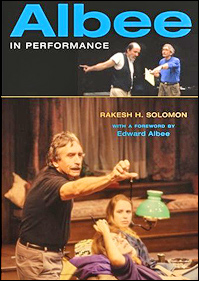 |
|
By Rakesh H. Solomon with a Foreword by Edward Albee
Published by: Indiana University Press
Publication Date: July 1, 2010
List price: $24.95 paperback ($65 cloth); 320 pages; 22 b&w illustrations
It must be extremely gratifying for a writer when his subject—particularly one as exacting as Edward Albee—thinks highly enough of his effort to praise it. Such is the case with Rakesh H. Solomon, whose examination of Albee's directorial vision for his own plays received enthusiastic approval from the playwright under the microscope. As Albee writes in the Foreword to Solomon's study, "The fact that the subject is me and the environment is my work as a director could pose problems if my delight at the book's clarity and ultimate objectivity were not doubled by Mr. Solomon's understanding of theatrical process and practical result." According to publisher notes, Solomon, who teaches in the Department of Theatre and Drama at Indiana University Bloomington, was given rare access to Albee the director, enabling him to reveal how the playwright "has shaped his plays in performance, the attention he pays to each aspect of theatre and how his conception of the key plays he has directed has evolved over a five-decade career." The author interviewed Albee numerous times over the years, attended many rehearsals of his plays, and observed and recorded every aspect of his directorial work, with special attention paid to the major works, from The American Dream and Zoo Story to Who's Afraid of Virginia Woolf?, as well as later plays such as Marriage Play and Three Tall Women. In addition Solomon perused drafts of Albee's plays, unpublished scripts and other restricted material and through the years was permitted unconstrained access to many of his actors, designers, stage managers, producers and directors—among them, actors Irene Worth, Frances Conroy, Tony Musante, Shirley Knight and Marian Seldes; and directors David Esbjornson, Lawrence Sacharow and Alan Schneider—interviewing them about all aspects of staging, from rehearsal to actual performance.
| |
 |
|
By David Mamet
Published by: Faber & Faber
Publication Date: April 15, 2010
List price: $22 hardcover; 144 pages
In a recent broadcast of Comedy Central's "The Colbert Report," the host razzed his guest, playwright-director David Mamet, for employing what he termed the highfalutin spelling of the title of his book, instead of—according to Stephen Colbert (whose very funny tongue seems to be perpetually lodged in his cheek)—spelling it the way we Americans and God intended: Theater with an "er." Of course, the very suggestion that Mamet was going soft—uttered even in jest—could not be further from the truth, as "Theatre" is yet another iconoclastic work from the man who gave us such plays as American Buffalo, Glengarry Glen Ross, Speed the Plow and the current Broadway drama Race (Ethel Barrymore Theatre). In "Theatre," the writer's critical scalpel is poised at everything from issue plays to political correctness to method actors to Stanislavski (whom he described to Colbert as a "Commie"). In Mamet's theatre, there is no place for acting theory and directors. Actors are good by definition, and if they are not good, then they are not actors. If they are good, he contends, they work better without the interference of directors, whom he believes would be much better off acting as traffic cops—telling actors where to stand and how to move—than as interpreters of plays. In his maturity, Mamet rejects the books about theory he devoured as a young man, when he first came under the theatre's spell, in favor of a more pragmatic way to present theatre, where the main goal should be to entertain, where rehearsals are there for actors to understand the words and not their feelings, and where the playwright's main goal is to create surprise. Mamet, of course, is keenly aware of the reaction his theories could evoke. As he writes in his opening chapter, if theatre were a religion, "many of the observations and suggestions in this book might be heretical." That's probably an understatement.
| |
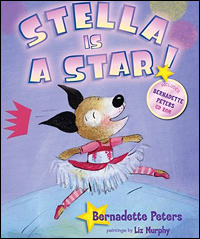 |
|
By Bernadette Peters; Illustrated by Liz Murphy
Published by: Blue Apple Books
Publication Date: April 7, 2010
List price: $17 hardcover with CD; 40 pages
There once was a dog—a little pit bull pup—that no one cared for, who thought she would be much better liked if she were more pleasing and graceful, like a ballerina. But not just any old ballerina: No, she must become a pig ballerina. So she masquerades as one and calls herself Princess Pig. Along her adventure, Stella learns not only about the joy in following her heart's desire but also that it's really okay to be who she is. This delightful tale, geared for children ages 4 and up, sprung from the imagination of the equally delightful Bernadette Peters, two-time Tony Award winner for Best Actress in a Musical—for Song & Dance and Annie Get Your Gun—and star of such other Broadway musicals as Mack and Mabel, Sunday in the Park With George, The Goodbye Girl and Gypsy (all of which garnered Tony nominations for the actress). It's a story, Peters recently told Playbill.com, "about not judging people from the outside, and not being afraid to accept and love yourself for who you are." The book, which is whimsically illustrated by Liz Murphy and also includes a CD with an original song written and performed by Peters, is Peters' second step into the world of children's books. Her first book was titled "Broadway Barks." Published in 2008, it also featured illustrations by Murphy as well as an accompanying CD and told the story of a little dog named Kramer who is all alone and must fend for himself, which he does ably once he finds a lady in the park and decides to follow her. Peters' love of animals was the inspiration behind both books and both feature title characters named after her own dogs, Kramer and Stella, whom the actress adopted from shelters. When not onstage Peters, who it was recently announced will star with Elaine Stritch in the current Broadway production of A Little Night Music (replacing Catherine Zeta-Jones and Angela Lansbury, respectively), is most devoted to Broadway Barks, the organization she co-founded in 1998 with her animal lover pal Mary Tyler Moore to promote the adoption of shelter animals, to network the many shelters and rescue groups throughout New York City and to educate in the areas of responsible pet ownership, the importance of proper pet identification, etc. On July 10, pet lovers will gather in Shubert Alley for the organization's annual dog and cat adopt-a-thon, after which Peters will be signing copies of "Stella is a Star!" in the lobby of the Gerald Schoenfeld Theatre. Click Broadway Barks 12 for Playbill.com's report on the upcoming festivities or go to www.broadwaybarks.com.
| |
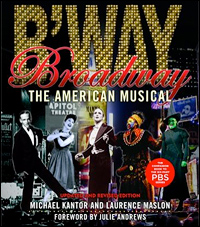 |
|
By Michael Kantor and Laurence Maslon
Published by: Applause Theatre & Cinema Books
Publication Date: June 2010
List price: $35 paperback; 500 pages, illustrated
In 2004 PBS aired a documentary that almost put the lie to the notion of theatre as an ephemeral art form. "Broadway: The American Musical," created by writer-director-producer Michael Kantor and narrated by Julie Andrews, was an epic chronicle of the evolution of the Broadway musical throughout the 20th century and an examination of its place in American culture. Kantor unearthed riches that brought every period vividly to life, including archival news footage, lost and found television performances, cast recordings and on-camera interviews with many of the architects of musical theatre as we know it today; and the documentary won an Emmy Award for Outstanding Nonfiction Series. It also produced a lavishly illustrated companion book written by Kantor and Laurence Maslon that has been updated in an attractive new paperback edition. The new volume contains all the joys of the original—images of theatre marquees, production stills and rehearsal shots, sheet music, posters and scenic renderings—and it has been updated to include coverage of the 2010-2011 season, with a new chapter about musicals that debuted since the original hardcover publication. The book also includes a new Foreword by Julie Andrews who writes about her first rehearsal for My Fair Lady and conveys the goose-bump experience to which any lover of musical theatre will relate: "There is something visceral about the appeal of a great American musical, whether you are starring in one, or seeing one for the first time as a youngster. It grabs you.
NEW NOVELS
By playwrights David Rabe, Theresa Rebeck and Joanne Sydney Lessner
| |
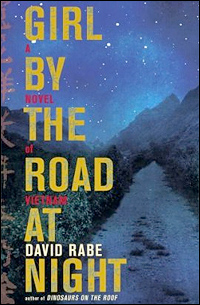 |
|
By David Rabe
Published by: Simon & Schuster
Publication Date: June 1, 2010
List price: $23 hardcover; 228 pages The subject of Vietnam—the war and the psychic and physical horror left in its wake—has been explored on stage many times by Tony and Obie Award–winning playwright David Rabe (The Basic Training of Pavlo Hummel, Sticks and Bones, Streamers), but this is the first novel he has written on the subject. According to publisher notes, much of the book was written in the early 1970's after Rabe's own return from military service, and this publication is the result of his having revisited his early notes. The novel's protagonist is Pfc. Joe Whitaker, who buries his fear of being imminently deployed to Vietnam in drink. His sense of isolation is further accelerated when his father suffers a debilitating heart attack (his mother abandoned the family long ago) and he discovers that his former girlfriend, for whom he leaves his Wisconsin farm to track down in Washington, DC, has married. In Vietnam he meets a young woman named Lan, who has been forced by the dire circumstances caused by the war to work as a prostitute to survive. Her assignations are lifeless and she is frequently subject to debasement at the hands of her clients, the GIs. She endures by remembering better times and losing herself in the fantasy world of he movies. Her first meeting with Whitaker is meant to be no more than another anonymous hook-up with a soldier, yet in each other they recognize an underlying humanity that draws these two lost souls together, only to be threatened by the advancing war and its ruthless racism and hatred.
Twelve Rooms with a View
By Theresa Rebeck
Published by: Shaye Areheart Books
Publication Date: May 2010
List price: $24.99 hardcover; 352 pages
From Theresa Rebeck, whose plays include Mauritius, The Scene, The Water's Edge, and Omnium Gatherum (a Pulitzer finalist), comes a novel about a dysfunctional family's real estate war. While attending her mother's funeral, 32-year-old Tina Finn learns from her two sisters that their mother has left them an $11 million apartment on Central Park West that had belonged to her husband of just a few years. It seems that while Tina had been slaving away as a cleaning woman in a trailer park, her formerly impoverished, alcoholic mother married well and moved into the manse with Bill. Since Mom died without a will, the sisters aim to claim what is rightly theirs as her only heirs by forcing Tina to move in and take possession of the apartment. Enter Bill's sons, who have other ideas about holding on to their father's pad. A real estate war erupts replete with appearances by the building's eccentric blue-blood residents; a sympathetic, hassled doorman; and a romantic entanglement with the building playboy, while Tina, notes the book's jacket, is "forced to decide just how far she'll really go for twelve rooms with a view."
Pandora's Bottle
By Joanne Sydney Lessner
Published by: Flint Mine Press
Publication Date: June 12, 2010
List price: $13.99 trade paperback; 336 pages
Like the opening of that mythological Greek box, the uncorking of a fabled bottle of wine results in unexpected repercussions in first-time novelist Joanne Sydney Lessner's tale. Lessner, who with her husband, composer/conductor Joshua Rosenblum, has written several musicals—including Fermat's Last Tango—was inspired when she heard about an account of an actual incident involving a bottle of 1787 Château Margaux whose contents landed on the floor of the Four Seasons. In Lessner's hands and imagination, the story became one of financier Sy Hampton, who purchases a legendary bottle of 1787 Château Lafite, once owned by Thomas Jefferson. Rather than share it magnanimously with the world, Sy's plan is to reassert his middle-aged virility by uncorking the precious liquid privately in the company of a female companion. Muddying up his intentions is an ambitious restaurateur, who views the event as an opportunity for publicity, while a waiter on the verge of his Broadway debut and the beautiful Brooklyn girl Sy hopes to impress are caught in the crossfire.
PLAYS OF NOTE
I'm Black When I'm Singing, I'm Blue When I Ain't and Other Plays
By Sonia Sanchez
Published by: Duke University Press
Publication Date: September 2010
List price: $19.95 trade paperback ($69.95 cloth); 208 pages
This is the first collection of plays by one of the most prominent writers in the Black Arts movement, poet and activist Sonia Sanchez. The volume includes five of Sanchez's plays from the 1970s—The Bronx Is Next, Dirty Hearts, Sister Son/ji, Malcolm/Man Don't Live Here No Mo and Uh, Uh; But How Do It Free Us?—two previously unpublished plays—I'm Black When I'm Singing, I'm Blue When I Ain't and 2 x 2—and three essays in which Sanchez reflects on her art and commitment to social justice. Scholar Jacqueline Wood has edited the collection and writes of Sanchez in her Introduction: "Incorporating the responsibility of the poet into the venue of dramatic art, she has successfully accomplished what few militant writers have done well—transcending the genre divide."
Boston Theater Marathon XI 2009 Anthology
Edited by Kate Snodgrass
Published by: Smith & Kraus Publishers
Publication Date: August 2010
List price: $24.95 paperback; 324 pages
The Boston Theater Marathon, now in its 11th year, is an annual tradition that utilizes hundreds of actors and dozens of directors to sponsor 50 ten-minute plays in 10 hours, each one supported by a different New England theatre company. That's five plays per hour! The BTM is the winner of a 2000 Elliot Norton Award and a Dramatists' Guild Citation for its work in forging relationships between playwrights and theatre companies throughout New England. All net proceeds from the marathon, notes Kate Snodgrass in her Introduction to this 2009 anthology, "go to the Theatre Community Benevolent Fund, a charitable organization that helps New England theatre artists, technicians, and companies in times of need," including help with medical emergencies, fires, vandalism, etc. Among the 50 plays in this collection are Sex for a Change by Robert Brustein, who has also written a rousing Foreword to the anthology; What Strong Fences Make by Israel Horovitz; No Skating by Dana Biscotti Myskowski; and The Liquidation of the Cohn Estate by Edmond Caldwell. About the annual event, Brustein writes: It is "the greatest camp ground for New England theater artists available, providing retreats for the elite and the beat, havens for the mavens, and a center where one can mingle freely with the entire theater community, audience members included."
***
WHAT'S ON MY NIGHTSTAND
| |
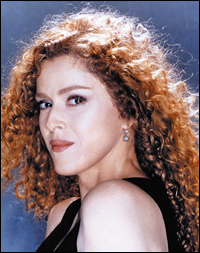 |
|
Bernadette Peters, the two-time Tony winner who on July 13 assumes the role of Desirée Armfeldt in A Little Night Music (Walter Kerr Theatre), is reading "This Time Together: Laughter and Reflection" by Carol Burnett.
"She's genius—no wonder her sense of humor with how she just deals with life . . . makes you smile and chuckle."
LIN-MANUEL MIRANDA
Lin-Manuel Miranda, currently represented on Broadway by the 2008 Tony Award–winning Best Musical In the Heights (Richard Rodgers Theatre)—for which he was creator, composer, lyricist and original Tony-nominated star—and West Side Story (Palace Theatre)—for which he provided Spanish translations of Stephen Sondheim's lyrics, is reading the soon to be published "Finishing the Hat: Collected Lyrics (1954–1981) with Attendant Comments, Principles, Heresies, Grudges, Whines and Anecdotes" by Stephen Sondheim.
"Steve Sondheim sent me a draft of his upcoming book on lyrics, to be released later this year. That's all I've been reading all summer. I've been trying to keep myself to only a chapter a day, but it's very difficult. His essays and asides about his own lyrics are brilliant and illuminating, and reading his mini-essays about other lyricists (Gershwin, Porter, Coward) is like watching Zeus hurl thunderbolts. He's going to cause a lot of heated debates, that's for sure. It's going to be required reading for any musical theater lover from here on out. I'm grateful to be reading it early. Pre-order it now, Playbill readers!"
KATE BALDWIN
Kate Baldwin, a 2010 Tony nominee for Best Actress in a Musical (Finian's Rainbow) and currently appearing in the London production of Paradise Found, is reading "The History of Love" by Nicole Krauss.
"Having just started it, I put it down after twelve pages because I needed to breathe. Its beauty is terrifying and astounding. I'm gong to try and pick it up again tonight."
| |
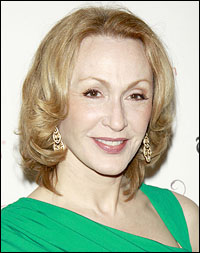 |
|
| photo by Joseph Marzullo/WENN |
Jan Maxwell, a double Tony Nominee this year for both Best Actress in a Play (The Royal Family) and Best Featured Actress in a Play (Lend Me a Tenor), is reading "Half The Sky" by Nicholas Kristof and Sheryl WuDunn.
"An incredible book. I have been reading Kristof's column for years and he is a true humanitarian. This book is about atrocities committed against girls and women throughout the world, with stories of some of them overcoming horrific odds and making a difference, and what we can do to help them (www.halftheskymovement.org). I would love to start a theatre community–based organization to raise money so these girls can be safe, thrive, have an education and help save the world."
SUTTON FOSTER
Sutton Foster, who won a 2002 Tony Award for Best Actress in a Musical for Thoroughly Modern Millie, will soon star in the world premiere of Paul Weitz's Trust, previewing July 23 at Second Stage, and—it was just announced—will return to Broadway in a 2011 revival of Anything Goes, is reading "Game Change: Obama and the Clintons, McCain and Palin, and the Race of a Lifetime" by John Heilemann and Mark Halperin.
"I'm in a book club and this is our new book. I'm only about 20 pages in . . . and I must admit that I'm not a very political person. As soon as someone starts talking politics my eyes glaze over and I start thinking of rainbows and puppy dogs . . . But so far this book has been fascinating. It's been recommended to me by several people, so I'm eager to read more of it. The last book I read was "The Help" by Kathryn Stockett. I loved this book. It was so inspiring . . . especially because it takes place in the South and is about women really taking risks and standing up during a time when it was socially so repressed. I highly recommend it to everyone."
| |
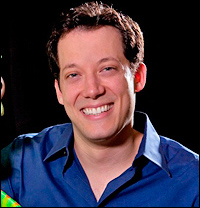 |
|
John Tartaglia, a 2004 Tony nominee for Best Actor in a Musical for Avenue Q who has gone behind the scenes and under the sea with ImaginOcean (New World Stages), the new live, black light puppet show he created, is reading "Harry Potter and the Deathly Hallows" by JK Rowling.
"This is my second time reading it. In fact, I'm in the process of re-reading the entire series because I am getting ready to go down to the new Harry Potter Theme Park in Orlando. JK Rowling's writing is so brilliant and it's wonderful to get lost in the world she's created. I love her attention to detail and uncover something new each time I re-read one of the books. It's great bedtime reading for when I need to put a little magic in my life."
MICHAEL MAYER
Michael Mayer, who has won four Tony Awards for his direction of both plays (1998's A View From the Bridge) and musicals (You're a Good Man, Charlie Brown, Thoroughly Modern Millie and Spring Awakening) and who is currently represented on Broadway by American Idiot and Everyday Rapture, is reading "Istanbul" by Orhan Pamuk.
"I have about 9 books on my night table at any given time. I'm currently devouring Orhan Pamuk's "Istanbul," a beautifully told memoir and evocative portrait of a city that I'm excited to visit later this month."
*
Passionate about theatre books? See what the Playbill Store has on its shelves.







Little-Fang.jpg)

